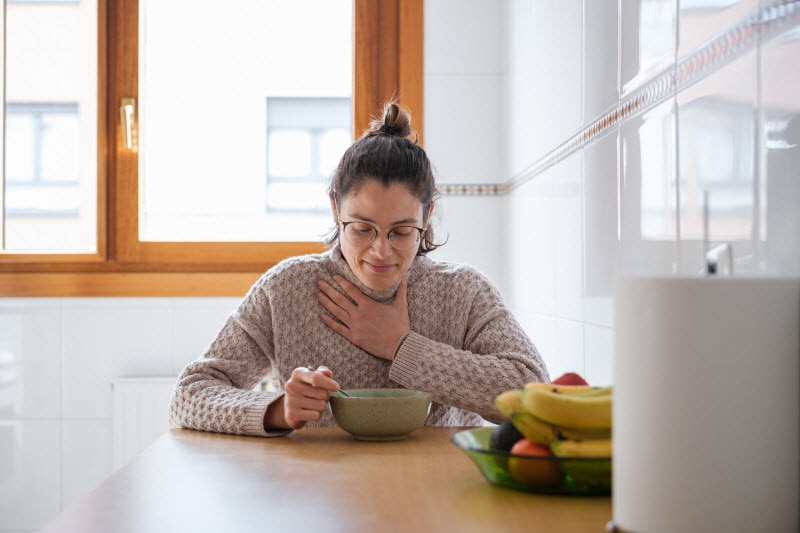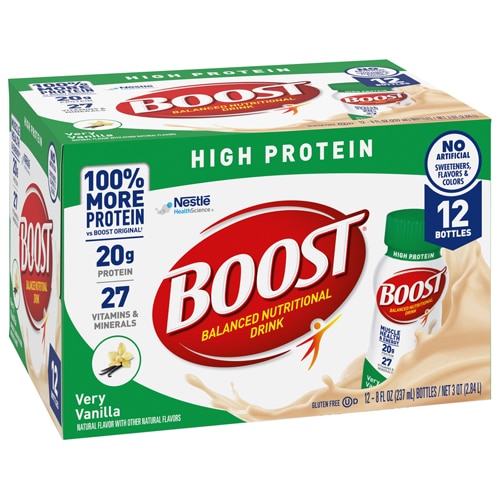[vc_row][vc_column][vc_column_text]Losing your appetite doesn’t seem like a big deal – until it happens to you. We often take for granted how much enjoyment food brings to our lives, until that enjoyment is gone. Appetite loss is frustrating, but it also can have serious consequences for your health. It can lead to malnutrition, unintended weight loss and muscle mass loss – which, depending on the magnitude, can lead to poorer recovery from illness, a decline in health and even mortality, when severe.
1-2

So, why does appetite loss happen, and what can you do to get back in the mood for food? Let’s take a look at some potential causes and solutions, including a helpful two-day, high-calorie meal plan to help.
What causes loss of appetite?
A variety of conditions may cause or contribute to appetite loss. They include:
- Bacterial or viral infections: the common cold, COVID-19, flu, etc.
- Chronic medical conditions: gastrointestinal, kidney, liver, heart or lung conditions, cancer, etc.
- Depression, anxiety, mental illness
- Social isolation
- Side effects of certain medications
- Pain
- Aging
The exact mechanism of appetite loss can vary, with some knowns and some theories. Here are some potential reasons
2:
- Chemical, neurological and/or hormonal changes
- Slowed or altered digestion
- Reduced metabolic rate
- Loss of taste and smell
- During illness, the body may dedicate more energy to fighting off “the bad stuff” if less energy is needed to digest food
- Viruses and bacteria may not have as much food to grow on if there is less food intake
A vicious cycle can occur once you’ve lost your appetite: the less you eat, the less hungry you are; so you eat less, then you become even less hungry as your appetite spirals downward. It’s important to catch and stop this cycle early by eating what you can as detailed below.
Should you “feed a cold” or “starve a fever?”
While there are many theories for how this adage came about, the short answer is “no.” You should feed both. A
small, older study tested this folklore, and the results suggested that nutritional status does affect the immune system response; however, conclusions could not be drawn as to what is most helpful.
3
Most experts and dietitians agree that starving is never recommended. It’s important to eat as much as you comfortably can if your appetite is lost. And fluids are vitally important. If you eat less for just a few days, it’s not likely to be detrimental. However, if you suffer from longer-term appetite loss, it’s a good idea to consider some strategies to improve your food intake. Remember, adequate calorie and nutrient intake can help your immune system do its job.
Note that for children, eating and drinking enough is even more crucial whether it’s a cold, fever or other illness.
How to get your appetite back
If illness caused you to lose your desire to eat, typically when you get treatment, recover or when the illness stabilizes, your appetite will return. For long-term appetite loss, try encouraging eating by sharing meals with loved ones, going out to eat and cooking or eating your favorite foods.
Exercise can also help ramp up
metabolism and the drive to eat. Many people find that once they start eating a bit more, they feel hungrier and that vicious low-appetite cycle eases up.
How to eat for appetite loss and recovery
Most people with a loss of appetite aren’t ready to jump into eating, so a gradual return to your normal food habits is recommended, especially if you’ve suffered for a longer time or have digestive issues. Dietitians often recommend choosing foods that are highly palatable, easy to digest and energy-dense – typically favorite
comfort foods!
This may mean starting out with foods that are lower in fiber, higher in sugar, salt, fat and calories and more processed or refined.
1 Eat what you crave and don’t be concerned too much with balanced nutrition until you are able to eat more. All of this may seem counterintuitive to health, but this may be exactly what you need until you can build up an appetite.
To boost your food intake, try these tips
1:
- Eat several small meals and snacks – four to six mini meals throughout a day.
- Eat something every two to four hours.
- Save drinks for between meals instead of with meals. That way you’ll fill up on food, not fluids. Only drink small amounts at meals.
- Add extra butter, oil or cream to foods and during cooking.
- Add peanut butter or nut butters to foods (toast, oatmeal, fruit slices, smoothies, crackers, etc.).
- Use more sauces, gravy, mayo, sour cream and salad dressings. Do not opt for low-calorie versions.
- Add sugar, syrup, honey or jam to foods and drinks.
- Enjoy dessert
If you can’t bear the thought of eating, try drinking a high-calorie beverage instead. Drinking is usually more palatable when you don’t feel like eating. Try a milkshake, chocolate milk, juice, smoothie or an oral nutrition supplement (ONS) such as
Soylent,
Ensure Clear or
Ensure Plus. An ONS is typically recommended if you find yourself eating less for more than a few days. Use it between meals so that you still have room for regular food intake.
Here is a two-day, high-calorie meal plan that can be followed if you’re struggling with low appetite.
While many people jokingly say they’d love to lose their appetite (and a few pounds with it), it’s not something to wish upon yourself given the potential spiral of poorer health. It’s important to note that people in larger bodies are just as at-risk for malnutrition consequences. Adequate food intake is important regardless of body weight.
1
If you or someone you know has been struggling with appetite loss, consider strategies to reverse it as quickly as possible and consult a doctor if appetite loss lasts longer than a few days. Try a few of the tips discussed and you may slowly start feeling hunger and enjoying one of the most important pleasures of life again – food!
Dietitians are well versed in helping people balance nutrition, food enjoyment and health tailored to their lifestyle. If you need a little help in that area, or for more personalized food-as-medicine advice,
book a Telenutrition appointment with any of our talented Kroger Health Dietitians.
Sources:
- Academy of Nutrition and Dietetics Nutrition Care Manual. Accessed November 17, 2022.
- Wysoki?ski A, Sobów T, K?oszewska I, Kostka T. Mechanisms of the anorexia of aging-a review. Age (Dordr). 2015;37(4):9821. doi:10.1007/s11357-015-9821-x.
[/vc_column_text][/vc_column][/vc_row][vc_row][vc_column][vc_text_separator title="Featured Products" border_width="2"][vc_row_inner equal_height="yes" content_placement="middle" gap="35"][vc_column_inner width="1/3"][vc_single_image image="166072" img_size="full" alignment="center" onclick="custom_link" img_link_target="_blank" css=".vc_custom_1681686800502{padding-right: 7% !important;padding-left: 7% !important;}" link="https://www.vitacost.com/mrm-natural-gainer"][/vc_column_inner][vc_column_inner width="1/3"][vc_single_image image="166071" img_size="full" alignment="center" onclick="custom_link" img_link_target="_blank" css=".vc_custom_1681686847945{padding-right: 7% !important;padding-left: 7% !important;}" link="https://www.vitacost.com/ensure-original-nutrition-shake-milk-chocolate"][/vc_column_inner][vc_column_inner width="1/3"][vc_single_image image="166073" img_size="full" alignment="center" onclick="custom_link" img_link_target="_blank" css=".vc_custom_1681686884632{padding-right: 7% !important;padding-left: 7% !important;}" link="https://www.vitacost.com/slimfast-keto-fat-bomb-stuffed-snack-cups-cookies-creme"][/vc_column_inner][/vc_row_inner][/vc_column][/vc_row]
 So, why does appetite loss happen, and what can you do to get back in the mood for food? Let’s take a look at some potential causes and solutions, including a helpful two-day, high-calorie meal plan to help.
So, why does appetite loss happen, and what can you do to get back in the mood for food? Let’s take a look at some potential causes and solutions, including a helpful two-day, high-calorie meal plan to help.



